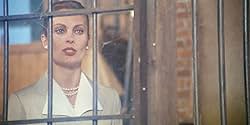AVALIAÇÃO DA IMDb
5,6/10
531
SUA AVALIAÇÃO
Adicionar um enredo no seu idiomaA blind boy, who lives alone with his mean sister in a rundown hotel in Venice, receives a vision that warns him of the upcoming birth of the Antichrist. Soon, his sister mysteriously become... Ler tudoA blind boy, who lives alone with his mean sister in a rundown hotel in Venice, receives a vision that warns him of the upcoming birth of the Antichrist. Soon, his sister mysteriously becomes pregnant.A blind boy, who lives alone with his mean sister in a rundown hotel in Venice, receives a vision that warns him of the upcoming birth of the Antichrist. Soon, his sister mysteriously becomes pregnant.
- Direção
- Roteiristas
- Artistas
Avaliações em destaque
My third Ugo Liberamore film and it seems unlikely I'll get the chance to see any more. These three, The Sex Of Angels, May Morning and this were hard enough to get hold of but all very much worth a search. If this Venice set horror is not quite up to the other two, it isn't far off and I enjoyed it. My print was pretty degraded and the film shot in Venice in the winter but I still reckon this could be the best looking Venice on film. Creepy and unsettling with moments of true horror, this intrigues from the very start with the blind boy being led down the narrow alleyways and across the tiny bridges. The music helps keep things from becoming too ordinary and Playboy 'playmate', Rena Niehaus a welcome distraction from some of the more grisly terrors. I've seen this described as a giallo, which it is not and moreover, I have to say, it doesn't crack along like some wild thriller but with Rosemary's Baby and Don't Look Now merely as undertones this is a very different vision of satanism.
I have to admit, I LOVE these Italian "rip-offs" of "The Exorcist"/"The Omen"/"Rosemary's Baby" that were big in the 1970's, even the bad ones. But this one is actually pretty good. I'd rank it ahead of Ovidio Assontis' "Beyond the Door", Alberto DeMartino's "The Antichrist" and Pier Carpi's "Ring of Darkness". It's difficult to compare it to "The Eerie Midnight Horror Show" or "Malabimba" because those were more straight-out sex romps. It's about on par with DeMartino's second attempt "Holocaust 2000", but it is more scary and less over-the-top silly. It was probably influenced to some extent by Nicholas Roeg's "Don't Look Now", what with its Venice setting and its young blind protagonist who keeps having apocalyptic visions. The protagonist is pooh-poohed by his sighted older sister (Rena Niehais), but she doesn't seem to find it strange when everyone around them starts dying--first their guardian, then the couple who own the pension they come to stay at (which somehow results in them inheriting the place). Then a sinister man from the boy's visions shows up at the pension and seduces the sister, impregnating her by a not-so-immaculate conception (she only gives him oral sex!). After the baby is born, the blind brother makes several attempts to kill it (the most memorable scenes in the movie), but he may be playing right into Satan's hands. . .
These Italian "rip-offs" are almost all a lot more original than they're given credit for. The low-budget Italian industry simply lacked the money to imitate big-budget Hollywood spectacles like "The Exorcist" or "The Omen" too much(and they lacked the sensibilities to imitate the subtle paranoia of a film like "Rosemary's Baby"), so they were forced to be inventive. This one has some especially effective scenes such as when the boy goes to drink out of a holy well in an effort to cure his blindness only unbeknownst to him, it is apparently full of rats and slimy black snakes!
The cast is also impressive, especially the female cast. German Playboy Playmate Neihaus turns in a surprisingly good performance (and not-so-surprisingly gets naked several times). And speaking of getting naked, the perpetually unclothed Ely Galeani and Angela Covello also show up as part of the sister's strange but very sexy babysitting coven. And Greek actress Olga Karlatos, who would later appear in several Lucio Fulci movies and as Prince's mom (!) in "Purple Rain" also appears as an especially ambiguous and mysterious character. Of course, it greatly helps everyone's performance that the English dubbing is pretty competent for a change . Good movie. Check it out
These Italian "rip-offs" are almost all a lot more original than they're given credit for. The low-budget Italian industry simply lacked the money to imitate big-budget Hollywood spectacles like "The Exorcist" or "The Omen" too much(and they lacked the sensibilities to imitate the subtle paranoia of a film like "Rosemary's Baby"), so they were forced to be inventive. This one has some especially effective scenes such as when the boy goes to drink out of a holy well in an effort to cure his blindness only unbeknownst to him, it is apparently full of rats and slimy black snakes!
The cast is also impressive, especially the female cast. German Playboy Playmate Neihaus turns in a surprisingly good performance (and not-so-surprisingly gets naked several times). And speaking of getting naked, the perpetually unclothed Ely Galeani and Angela Covello also show up as part of the sister's strange but very sexy babysitting coven. And Greek actress Olga Karlatos, who would later appear in several Lucio Fulci movies and as Prince's mom (!) in "Purple Rain" also appears as an especially ambiguous and mysterious character. Of course, it greatly helps everyone's performance that the English dubbing is pretty competent for a change . Good movie. Check it out
Nero veneziano is a bleak, unsettling descent into metaphysical horror, cloaked in the rotting beauty of Venice. The film's strongest asset is its heavy, almost oppressive atmosphere, which seeps into every frame like rising damp. The cinematography captures this decay with lingering shots of crumbling architecture, dim candlelit interiors, and the cold stillness of the canals, evoking a dreamlike but suffocating sense of dread. Cinematographer Vittorio Storaro's signature use of chiaroscuro and tinted color palettes (though less flamboyant here than in his later works) helps to ground the film in both realism and symbolic unease. That said, the narrative pacing often struggles under the weight of its imagery; the film indulges in visual mood at the expense of narrative momentum.
Among the cast, Rena Niehaus delivers a quietly gripping performance, her expressive face managing to convey vulnerability and unease without relying on melodrama. Ely Galleani, in a more ephemeral role, radiates a hypnotic presence that fits the film's tone even if her character feels underwritten. Luciano Virgilio, playing the lead, captures the physical and psychological decline demanded of him, but at times his delivery flattens under the script's cryptic weight. The erotic elements, including full nudity from both Niehaus and Galleani, are photographed in a subdued, non-gratuitous manner, blending seamlessly into the film's themes of mortality, vision, and corrupted innocence. However, the film's art-house ambitions often clash with its pulpy occult trappings, creating an awkward tonal imbalance that keeps it from fully succeeding in either realm.
A blind teenage boy is sent to Venice to recover from illness, only to become the focal point of a prophetic nightmare as visions of death and plague begin to merge with reality. His parents, both uneasy and secretive, struggle to understand the dark forces closing in, while the ancient city itself becomes a labyrinth of omens, shadows, and half-truths.
Among the cast, Rena Niehaus delivers a quietly gripping performance, her expressive face managing to convey vulnerability and unease without relying on melodrama. Ely Galleani, in a more ephemeral role, radiates a hypnotic presence that fits the film's tone even if her character feels underwritten. Luciano Virgilio, playing the lead, captures the physical and psychological decline demanded of him, but at times his delivery flattens under the script's cryptic weight. The erotic elements, including full nudity from both Niehaus and Galleani, are photographed in a subdued, non-gratuitous manner, blending seamlessly into the film's themes of mortality, vision, and corrupted innocence. However, the film's art-house ambitions often clash with its pulpy occult trappings, creating an awkward tonal imbalance that keeps it from fully succeeding in either realm.
A blind teenage boy is sent to Venice to recover from illness, only to become the focal point of a prophetic nightmare as visions of death and plague begin to merge with reality. His parents, both uneasy and secretive, struggle to understand the dark forces closing in, while the ancient city itself becomes a labyrinth of omens, shadows, and half-truths.
A blind kid starts getting horrible visions about the birth of the Antichrist when he and his sister moves in a rundown pension in Venice with their guardian relatives. I liked this Italian horror flick a lot! It's heavily influenced by Rosemary's Baby & The Omen but its got a personality of its own. Pretty slow pace but great surreal atmosphere there's a constant feeling of dread and uncertainty, good photography and an surprisingly clever script. And the Venice setting is always appreciated, that city is almost provocatively beautiful! Not much violence, but the few violent scenes were highly effective. Especially one scene really raised my eyebrow, those of you who have seen it probably know which one i'm thinking about... The bad dubbing is about the only really negative aspect I can think of right now, although I can imagine that some find it slow on action and maybe even a little boring. Not me though, I love slow, atmospheric films!
Other than for the Venice scenarios, this late Rosemary's baby clone is almost dismissable without any comment, with its story of a blind young man trying to battle against the evil spawn of his sister short relation (in fact, she was virgin, as Satan want to mock Jesus life and death for his son)with a dark stranger, probably Satan himself. Bad acting, bad story, bad special effects, gratuitous nudity. A real B-movie, but not as good as it should be
Principais escolhas
Faça login para avaliar e ver a lista de recomendações personalizadas
- How long is Damned in Venice?Fornecido pela Alexa
Detalhes
Contribua para esta página
Sugerir uma alteração ou adicionar conteúdo ausente



























